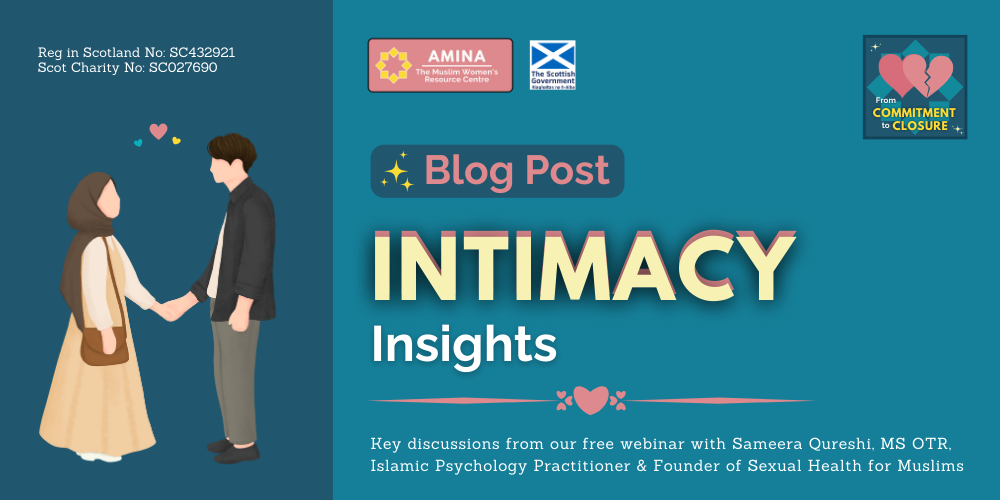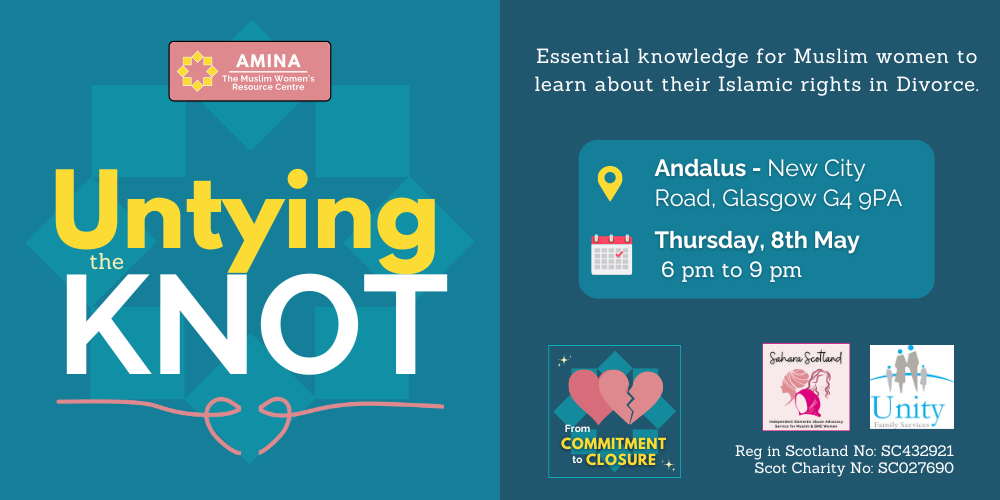
Intimacy Insights: Pre-Marital Advice for Muslim Women

Last year, we hosted Intimacy Insights, a free pre-marital webinar for Muslim women in Scotland. Featuring Sameera Qureshi, MS OTR, Islamic Psychology Practitioner & Founder of Sexual Health for Muslims, the session was the first in our Commitment to Closure series, exploring intimacy, boundaries, and the journey to healing.
In some Muslim & BME communities, discussions on intimacy and sexual health are considered taboo for cultural reasons. Many Muslim women abstain from sexual relations before marriage, and find themselves lost when it comes to intimacy, who to speak to for advice, and wonder whether they should rely on their future spouse as their primary source for sexual advice.
Intimacy Insights empowered women by addressing these concerns, while providing guidelines on essential topics and discussions. This blog post discusses key points from the webinar. If you are looking for advice around intimacy and sexual health, this is the post for you!
What is Sexual Intimacy?
Many women have fears and anxieties around intimacy – especially those who have not been sexually active before marriage. As Islam discourages sexual relations prior to marriage, Muslim women who choose to abstain from intimacy can feel overwhelmed while discussing intimacy with a potential spouse before marriage.
There are three realms that overlap to determine sexual intimacy. Emotional Intimacy is described as a deep sense of closeness, connection, and vulnerability felt between two people. This grows over time as you get to know one another, share your feelings, and become more connected. Spiritual Intimacy is built on a shared vision of your future together. This can include discussions around how you will live your lives together as a Muslim couple in order to deepen your connection with God. Physical Intimacy includes physical touch and connection. This can include non-sexual touches and closeness with your spouse.
Establishing all three forms of intimacy can lead to good sexual intimacy. Intimacy requires a degree of vulnerability, trust and closeness. Often when couples have issues within sexual intimacy, their problems can be attributed to issues in emotional, spiritual or physical intimacy. It is important to engage in open communication to discuss and resolve these issues.
What is the Islamic Take on Intimacy?
Intimacy as an Act of Worship
“Actions are judged by intentions.”
– Prophet Mohammed (Bukhari & Muslim)
Islamically, marital sexual intimacy is a sacred form of worship, with the goal of shared emotional and sexual satisfaction. Beyond the physical bodies, it brings two souls together, and includes three key themes:
- Sacredness: marital intimacy is the most sacred form of worship that married couples engage in, by choosing to fulfil your desires in marriage in an Islamically-guided way. Sameera explained that this provides a glimpse of pleasures of the afterlife that souls will experience.
- Privacy: it is crucial for couples to keep their intimate relations private, except if disclosing details while seeking professional help.
- Collaboration: intimacy should be based on collaboration and mutual pleasure. It is crucial that intimate relations do not contradict religious guidelines around marriage and compassion.
By keeping these three themes in mind, you can help to ensure that intimacy is an act of worship.
Islamic Rulings Around Intimacy
A crucial aspect of intimacy is that it cannot contradict the sunnah of marriage. There can be no forced intimate actions, coercion, or withholding of sexual relations. Intimacy should be performed on the basis of mercy, compassion and love, reflective of the sacred bond of the Nikkah (marriage).
Between husband and wife, marital responsibilities take precedence before all else. During the Nikkah, a couple considers God to be their witness and promise to fulfil the relationship in the most equitable way. Therefore, intimacy cannot be weaponised in any way, as this directly contradicts the sanctity of marriage.
In Islam, most forms of intimacy are allowed, with some exceptions. It is crucial to educate yourself on the rulings around this prior to marriage. Islamically, intimacy is not permitted while a woman is on her period, and anal intercourse is not allowed. Additionally, any form of intimacy that one spouse is uncomfortable with is also not allowed.
Is Intimacy a Duty or a Right?
“If any of you has intercourse with his wife let him be true to her. If he attains his pleasure before her then he shouldn’t hurry her away until she also attains her pleasure.”
– Prophet Mohammed (Ibn Qudumah)
Within marriage, men and women have equitable rights to pleasure. As intimacy should happen on the basis of mutual pleasure and collaboration, in the ideal scenario either spouse should focus on ensuring that they deliver their duties within intimacy, rather than demanding their rights.
However, in the case of a recurring theme where one partner is not receiving as they should, they should openly communicate about this and seek professional help, when required.
When to Discuss Intimacy with a Potential Spouse
Setting the Correct Intention
Intimacy can be a tricky subject to discuss with your future spouse. Before having these discussions, it is important to set a God-centred intention; your purpose is to focus on the higher Nafs (self). The Lower Nafs can tempt you to engage in sexualised behaviours like flirting, and asking for self-gratifying images. The Higher Nafs is driven by pure intentions and heart-centred conversations. You should aim to channel your Higher Nafs while discussing intimacy before marriage.
Many men educate themselves on sexual intimacy from the incorrect places; it is important for you to educate and empower yourself, rather than relying directly on your future spouse to teach you. If you are not comfortable about your own body, you may not feel comfortable engaging in intimacy with another person.
Phase 1: The Early Relationship
The early relationship phase is usually when you commit to getting to know one person. The purpose here is to set boundaries, expectations, and to establish safety. If someone treats you disrespectfully, you should not give them another chance as they should respect you for being a spiritual being. We are each responsible for managing our own sexual desires. Set boundaries for such behaviours, conversations and intimacy, and state your preferences in physical contact and how you intend to meet in public places.
Phase 2: Engagement
Engagements are big milestones but don’t change Islamic rules on Intimacy as you are not married yet. However, you may ask if your partner has been sexually active before and decide that you would like them to be tested for STIs. Do not ask for details around their past sexual history as this is not allowed Islamically.
If you have any history of trauma around intimacy, this can be mentioned briefly without going into details. You may also gauge their openness around premarital counselling and potentially continuing therapy after marriage.
Phase 3: Nikkah Date is Set
It is important to focus on your expectations for after marriage during this time. In Islam, there is no requirement for intimacy on the wedding night, and this can be delayed until you are both comfortable to move forward. Some key guidelines include:
- Being assertive and direct in conversations around your expectations, and having strong boundaries.
- Be honest about sensitive conversations and ask to set a time to discuss topics so that you both have adequate time to think about this.
- Use “I” statements while communicating how you feel, and do not make your fiancé feel defensive.
- Build a relationship with your GP or a gynecologist so that you have a women’s healthcare provider that you trust and can ask sexual health-related questions.
Sexual pleasure takes time, and both partners will need to prioritise this. Focus on building spiritual intimacy by praying and learning together. Connect emotionally by having ongoing conversations, and build physical intimacy outside of sex by expressing love as you would like to experience it.
Difficult Discussions
Sexual Triggers and Trauma
If at any point in the discussions you feel triggered or that your boundaries are being crossed, you can share this in a general way. Early on, no one is entitled to details. You can say that you feel anxious discussing certain topics due to past sexual trauma but do need to elaborate—what matters is voicing your concerns.
Pornography Use
Pornography is any form of visual media that is sexually explicit – including through words, images or videos. Pornography is harmful as it rewires your brain and how your respond to sexual stimulation. This impacts your sexual desire and how aroused you are with your spouse. If a potential spouse discloses the use of pornography before marriage, it is important to take this seriously, advise them to stop and seek therapy. Everyone’s boundaries differ so if you feel that this is a dealbreaker for you, it is important to go with your instincts.
Broken Engagements
In the case that things do not work out with a potential spouse, remind them that everything you shared was done with the intention of marriage. As your actions were well-intentioned, they should respect your privacy and not disclose private details to others. If you or someone you know needs help in the misuse of your intimate image abuse, please visit this page.
Final Remarks
Thank you to Sameera for joining us for Intimacy Insights – we appreciate the key takeaways and hope that this content has been beneficial for you. Sameera’s new book Soulful Sexual Health for Muslims releases in July. Find out more here.
To support our work and ensure that we continue to provide events and insights like this, please consider donating from as little as £1 – let’s continue to make a difference for Muslim & BME women in Scotland! Donate here.
If you are interested in seeking 1-1 Islamic Advice over the phone, call our Alima (Female Scholar) on the Helpline at 0808 801 0301, every Tuesday from 10 am to 2 pm.
Interested in attending our next workshop?

Don’t miss the next instalment in our Commitment to Closure series – Untying the Knot is our in-person Glasgow workshop with Shaykh Amer Jamil exploring the complexities of Islamic Divorce, including what constitutes a divorce and Triple Talaq. Our domestic abuse advocacy team Sahara Scotland will also provide practical information for Muslim women around the Khula process.
Register here – but hurry as spaces are limited!
References
- https://www.healthline.com/health/intimacy#benefits
- https://40hadithnawawi.com/hadith/1-actions-are-by-intentions/
- Ibn Qudumah, as cited in Al-Hibri & El Habti, 2006, p.211

